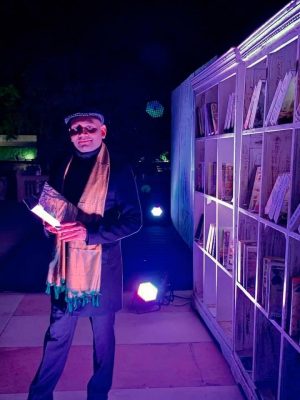Indian diplomats have a long and storied history of contribution to literature, ranging from acclaimed novels to short stories and poetry. India’s ambassador to Madagascar and Comoros, Abhay Kumar — author of eight poetry collections, most recently of “The Alphabets of Latin America,” and the editor of five poetry anthologies including “The Bloomsbury Anthology of Great Indian Poems” — is a noted member of that of the Indian litterateur-diplomat club. His poems have been published in several literary journals. Kumar’s poem, “Earth Anthem,” has been translated into over 50 languages. He has received the SAARC Literary Award in 2013 and was invited to record his poems at the Library of Congress, Washington D.C. in 2018.
The Diplomat’s Arun Budhathoki spoke with Kumar about his literary background and the importance of poetry amid dramatic global crises. The views expressed by Kumar in the following are personal; the interview has been lightly edited for clarity.
What is poetry to you? How did you start writing? Can you tell us a little bit about your literary work?
Poetry is anything exquisite that elevates our senses. The universe itself is uni-verse, a poem.
After passing the civil services examination in May 2003, I had plenty of free time. One day I happened to read “The Old Man and the Sea” by Ernest Hemingway. Reading it I realized that such a great story can be told in so few pages. It made me dream to write my own book someday. I started writing a blog, “Ideas & Universe,” in April 2005. When I arrived in Moscow in August 2005 I was fascinated by its beauty and grandeur. While learning Russian language and literature at Moscow State University I started writing a memoir of my family. At the same time, I began publishing my poems on my blog. My family memoir “River Valley to Silicon Valley” was published in 2007. This encouraged me to put together a collection of poems, “Enigmatic Love,” which was published in 2009. It was followed by poetry collections “Fallen Leaves of Autumn” (2010), “Candling the Light” (2011), “Remains” (2012), “The Seduction of Delhi” (2014), “The Prophecy of Brasilia” (2018), and “The Alphabets of Latin America” (2020). I have also edited poetry anthologies “CAPITALS” (2017), “100 Great Indian Poems” (2018), “New Brazilian Poems” (2019) and “The Bloomsbury Book of Great Indian Love Poems (2020).”
You have lived around the world and have written poems about those places. What did you intend to achieve from that?
Rilke has described poetic duty as “Ein zum Rühmen Bestellter” — “the one whose task it is to praise.” I want to celebrate the beauty and diversity of our planet in my poems, sing the places I visit, capture my feelings of wonder, record my experiences of meeting people living in different parts of the world, and create a poetic portrait of the Earth.
What is your writing process?
I write whenever I find time. I don’t have a set routine for it. I read a lot and write very little. I get an image, a line and then start building upon it gradually. I write it down and revisit it later and edit it until I’m fully convinced with the final outcome. Then it is ready for sending out for publication.
Do you feel poetry can connect people across the world in these trying times?
I think poetry connects us at a deeper level, no matter where we come from. Reading and sharing a poem creates lasting bonds, even among strangers. Its universal appeal reaffirms our common humanity and transform our minds. Poetry also helps us in promoting dialogues across cultures and other art forms such as music, dance and painting.
2020 was a challenging time for humanity and the world. Do you think poetry can still play a role in uplifting the human spirit amid a pandemic?
Poetry has been a source of great inspiration and support in elevating our spirit during the pandemic for a lot of people. I myself read a lot of poetry books during this time and found solace in them including the two Sanskrit classics “Meghaduta” and “Ritusamhara,” both by Kalidasa [an ancient Indian poet who lived between 4th and 5th CE].
Poetry is an intrinsic need of our species. We all use poetry in some form or the other to nourish our souls. With people’s attention spans becoming shorter, the strength of poetry is its concise form, which can hold the attention of the reader.
What role do you see poetry playing in a post-pandemic world?
We are facing a climate emergency, with mass extinction of species and runaway environmental pollution threatening life-supporting systems on our planet. The universal medium of poetry can help us inculcate a sense of wonder and eco-empathy for our fellow species inhabiting our planet.
What is your message for young and aspiring poets?
I would like to urge them to keep our cosmic oasis at the center of their thinking, writing, and existence, as Earth is our only home in the known universe. There is no planet B. Our real treasures are the eight million species who inhabit our planet with us. If we lose them, as at least one million of them already face extinction, the Earth will become a poorer place.
Arun Budhathoki is a Nepalese journalist, poet, and writer. He tweets at @arunbudhathoki













